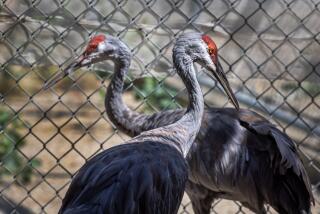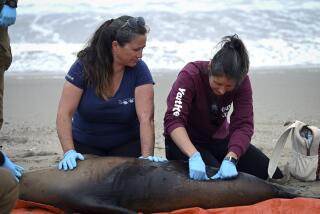There are 2 snow leopards at the San Diego Zoo. Both endangered cats have COVID-19
- Share via
SAN DIEGO — A second snow leopard has tested positive for COVID-19 at the San Diego Zoo, just days after an earlier case, the organization said Thursday.
Zoo staff tested stool samples from Naphisa, a 3-year-old female snow leopard, after she developed a cough “within the past few days,” according to a spokesperson. After the sample tested positive for the coronavirus in the zoo’s lab, the staff sent another sample to the California Animal Health and Food Safety Laboratory System; the state-level lab confirmed the result.
That’s exactly what had happened July 23, when the zoo announced that Ramil, a 9-year-old male snow leopard, tested positive for the virus after keepers noticed he had a cough and runny nose.
Naphisa and Ramil are eating and moving about normally, according to the zoo’s veterinary staff, and their coughs are beginning to improve.
The endangered cats live together in an enclosure they share with two Amur leopards. Once Ramil tested positive, the zoo staff assumed that the other three leopards would be exposed. All four animals are being closely monitored and quarantined, and their exhibit is closed to the public.
The zoo has yet to determine how the leopards became infected. In mid-January, the Safari Park’s gorilla troop became infected with COVID-19 after exposure to a keeper who was infected but asymptomatic. The gorillas have fully recovered.
Coronavirus infections in felines — from lions and tigers to domestic cats — have been rare and mild, according to the Centers for Disease Control and Prevention. But the stakes are always higher with endangered species. There are only 4,000 to 6,500 snow leopards in the wild, according to the World Wildlife Federation, and just 90 Amur leopards.
Naphisa and Ramil are the zoo’s only snow leopards. The organization hopes they’ll become a breeding pair, though Naphisa has yet to produce cubs.
The first snow leopard to live at the zoo arrived in 1949. Since then, 13 cubs have been born at the park.
Wosen writes for the San Diego Union-Tribune.
More to Read
Sign up for Essential California
The most important California stories and recommendations in your inbox every morning.
You may occasionally receive promotional content from the Los Angeles Times.











